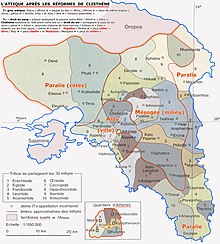
Antiochis (Ancient Greek: Ἀντιοχίς) was one of the ten tribes (phylai) into which the Ancient Athenians were divided.
Location and history
Is named after Antiochus, son of Heracles and Meda (daughter of Phylas, king of Ephyra).
Antiochis comprised 13 demes: Aigilia, Alopeke, Amphitrope, Anaphlystos, Atene, Besa, Eitea, Eroiadai, Kolonai, Krioa, Pallene, Semachidai, and Thorai.
Phalerum was a harbour belonging to the tribe. From this harbour the voyages of Theseus and Menestheus were said to have begun, for Crete and Troy respectively.
Socrates belonged to this tribe. The tribe was in possession of the prytany in the Council, at the time of the events concerning the ten generals active for Athens' navy in the battle of Arginusae.
Aristeides was in command of this tribe's contingent during the Battle of Marathon.
References
- E Vanderpool - Studies in Attic Epigraphy, History, and Topography: Presented to Eugene Vanderpool (p.170) ASCSA, 1982 ISBN 0-87661-519-1
- NF. Jones - Ionian tribes DOI: 10.1002/9781444338386.wbeah04146 Published Online: 26 OCT 2012 The Encyclopedia of Ancient History(ed. for nature of word < phylai >)
- N Fikri Alican - Rethinking Plato: A Cartesian Quest for the Real Plato (p.331) Rodopi, 2012 ISBN 94-012-0812-3
- R Hunter (Regius Professor of Greek at the University of Cambridge c.2005) - The Hesiodic Catalogue of Women: Constructions and Reconstructions (p.191) Cambridge University Press, 14 Jul 2005 (reprint) ISBN 978-0-521-83684-5, 349 pages
- Papazarkadas, Nikolaos (2011). Sacred and Public Land in Ancient Athens. OUP Oxford. p. 295. ISBN 978-0-19-969400-6.
- John S. Traill The Political Organization of Attica: A Study of the Demes, Trittyes, and Phylai, and Their Representation in the Athenian Council, Volumes 14-16 (p.13) ASCSA, 1975 ISBN 0-87661-514-0
- O Palagia, A Spetsieri-Choremi - The Panathenaic Games: Proceedings of an International Conference held at the University of Athens, May 11-12, 2004 (p.77) Oxbow Books, 26 Feb 2015 ISBN 1-78297-985-9
- John S. Traill - (same source as given previously here)
- J Robinson (D.D., Rector of Clifton, Westmoreland.) - Archaeologia Graeca, or the Antiquities of Greece; chiefly designed to illustrate the Greek Classics. To which are prefixed, a brief history of the Grecian States, and biographical sketches of the principal Greek writers 1827
- Nails, D - "Socrates" - A Chronology of the historical Socrates in the context of Athenian history and the dramatic dates of Plato's dialogues The Stanford Encyclopedia of Philosophy (Spring 2014 Edition), Edward N. Zalta (ed.)
- ^ Plato (2015). "Apology". In PL Miller; CDC Reeve (eds.). Introductory Readings in Ancient Greek and Roman Philosophy. Translated by Reeve. Hackett Publishing. p. 72. ISBN 978-1-62466-354-3. Retrieved 2015-04-17.
- Oxford Dictionary - prytany Oxford University Press
- M Dillon, L Garland (lecturer in Classics and Ancient History at the University of New England, New South Wales) - Ancient Greece: Social and Historical Documents from Archaic Times to the Death of Alexander (p.119) Routledge, 18 Jun 2010 ISBN 1-136-99138-7 (revised)
- N Sekunda (Ph.D 1981, taught at the Institute of Archaeology and Ethnology in Torun, Poland c.2002) - 490 BC: The First Persian Invasion of Greece (p.53) Archived 2016-03-06 at the Wayback Machine Osprey Publishing, 2002 ISBN 1-84176-000-5